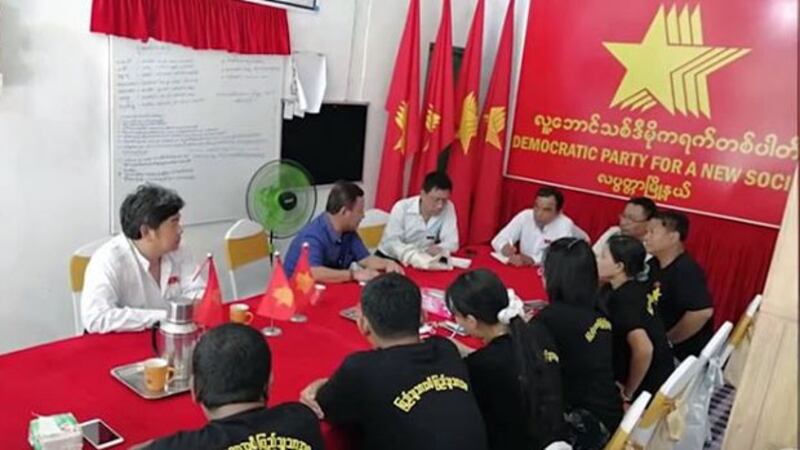One of Myanmar’s newest political parties has withdrawn its election pitch from its allotted state media broadcast airtime because the national election commission censored statements on poverty and other key issues, the party leader said Wednesday.
Ko Ko Gyi, chairman of the People’s Party, told RFA that edits to his election campaign speech by the Union Election Commission (UEC) are preventing him from airing the party’s full political stance ahead of Nov. 8 elections.
The speech that was to be delivered touched on poverty and the struggles of average citizens, high interest rates that hinder the competitiveness of local entrepreneurs, and a revenue system that burdens taxpayers.
The presidentially appointed UEC oversees Myanmar’s elections and vets parliamentary candidates. Campaign broadcast rules require that political parties submit scripts of their speeches to the commission before they can use their 15 minutes of airtime on state radio and television to outline their platforms during the election campaign period between Sept. 8 and Nov. 6.
The UEC cut two sentences about creating job opportunities: “Local entrepreneurs are now facing major hardships in competing with foreign investors because of high bank interest rates. In collecting tax revenue, we will make sure to broaden the base for collecting taxes to avoid tax burdens and create a simple and fair tax revenue system.”
Another sentence the UEC deleted from the speech dealt with the need for people to have a sufficient amount of income to maintain a healthy standard of living.
“The commission is censoring and editing our campaign speech before the voters can make a choice,” Ko Ko Gyi told RFA. “We don’t accept that because it has violated the basic principles and standards of a multiparty democracy. That’s why we’ve decided to not take part in broadcasts on state-owned media.”
He went on to say that there was no reason for the UEC to delete parts of the party’s speech because the sentences were not defamatory or meant to stir up racial tensions.

‘This party is not alone’
Rights advocates blasted the move, as they did earlier in September when other parties, including the Democratic Party for a New Society (DPNS), Dawei Nationalities Party, and Arakan National Party accused the UEC of censoring their campaign speeches before they aired on state broadcast media.
Mya Nandar Thin, a consultant from the New Myanmar Foundation, which monitors elections, said that this kind of censorship degrades the integrity of democratic elections.
“The election commission should minimize the cutting of campaign speeches and respect to the right of free speech,” she said.
Rights activist Nickey Diamond from Southeast Asia-based Fortify Rights said that free speech is crucial when countries like Myanmar are striving for a genuine democracy.
“Censorship of campaign speeches is an unfair act by the election commission, which is assigned by the ruling party,” he said, referring to Myanmar leader Aung San Suu Kyi’s National League for Democracy (NLD).
Diamond said he is “gravely concerned” whether the Nov. 8 elections will be truly free and fair.
“This party is not alone when it comes to having a campaign speech cut, so that means election officials are doubling the torment by violating the right to free speech,” he said.
NLD spokesman Monywa Aung Shin answered the critics by saying that although the government appoints the members of the UEC, it selects commissioners who are not affiliated with the ruling party.
The UEC works with its own mechanisms and follows its own principles in line with the election law, he said.
“They must have cut the campaign speech because the phrases conflicted with one of its principles,” he told RFA. “We will not interfere in the commission’s decision.”
A ‘rights-abusing censor’
Former Burmese Communist Party member Maung Maung Soe, who is now an analyst of ethnic and military affairs, noted that the right to campaign without undue interference or censorship is necessary so that the 2020 elections are free and fair.
“The commission should be careful about what it cuts from election campaign speeches,” he said. “If it is censoring every part it doesn’t agree with, then this is not in line with human rights and democratic standards.”
Phil Robertson, deputy Asia director of Human Rights Watch, told RFA in an email statement that the UEC is “acting as an anti-democratic, rights-abusing censor by interfering in the message content of various political party broadcasts.”
“By removing messages that critique the Myanmar government, the UEC shows contempt for freedom of expression, and demonstrates a profound lack of understanding about the principles underlying multiparty elections,” he said.
Nearly 7,000 candidates from more than 90 parties, as well as independents, are vying for 1,171 seats available in both houses of the national parliament and in state and regional legislatures.
The People’s Party — a relatively new political party founded by veteran activist Ko Ko Gyi, one of the 88 Generation student leaders from the 1988 pro-democracy protests — is fielding 152 candidates for seats in the national parliament and state and regional legislatures in Myanmar’s Nov. 8 general elections.
Reported by Nay Myo Htun for RFA’s Myanmar Service. Translated by Ye Kaung Myint Maung. Written in English by Roseanne Gerin.
